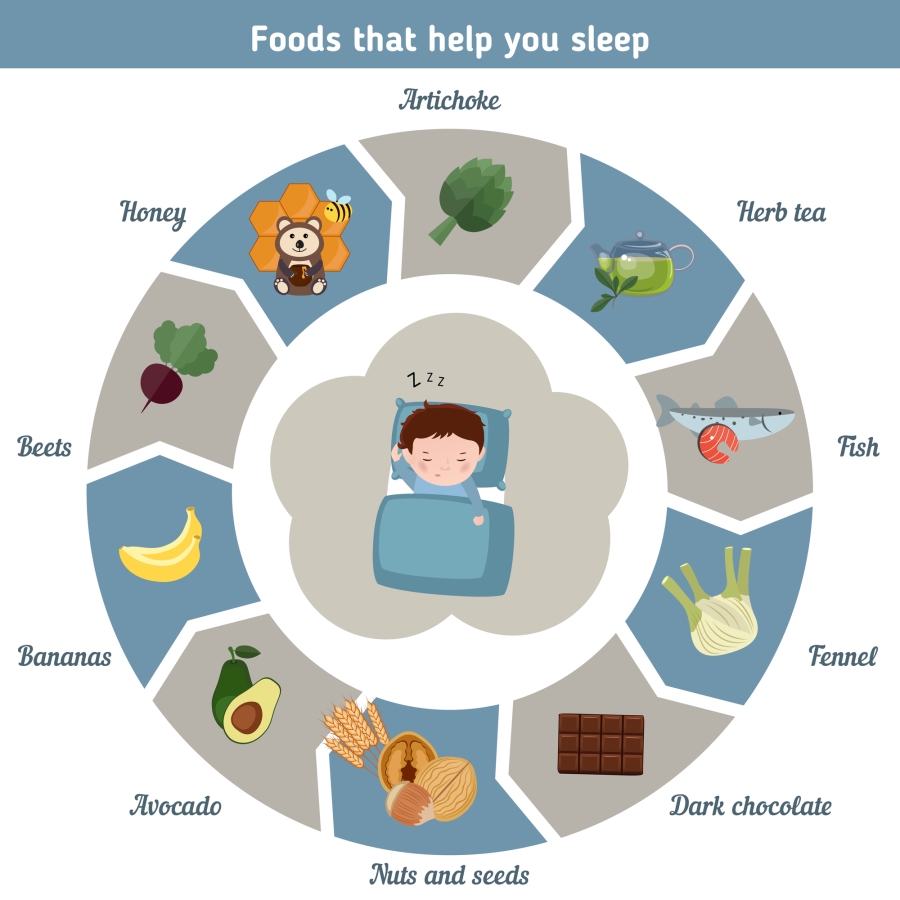The foods you eat can either help you sleep or prevent you from getting the rest you need. Not surprisingly, research shows that foods high in calories, fat and sugar may disrupt your sleep, especially when eaten right before bed (1). If there was ever any doubt, high fiber fruits and vegetables that are packed with lots of nutrients are best for inducing rest. But also did you realise that antibiotics can make you tired as well? There’s plenty more that can help aid (or not aid) you going to sleep though, so keep on reading to find out what that is. Here are the top ten foods to help you sleep better.
Best and Worst Foods For Sleep
Your diet affects just about every area of your health, including your sleep. Research shows that you can sabotage your own sleep by eating the wrong foods. A 2016 study published in the American Academy of Sleep Medicine found that diets high in sugar and saturated fat and low in fiber were linked to less restorative, lighter, and more disruptive sleep (2).
The study concluded that eating more fiber increased the amount of time test subjects spent in a slow wave, deep sleep. On the other hand, subjects who consumed larger amounts of saturated fat and sugar woke up more times during the night (2). To get the most restorative deep sleep possible, you’ll need to eat lots of unrefined plant compounds from fruits and vegetables. Here is a list of the ten best foods to start with.
- Almonds
Almonds are an excellent source of magnesium, which is required for sleep. According to a 2012 study, magnesium helps improve sleep efficiency, sleep time, and early morning wake-up times. It also reduces the amount of time it takes to fall asleep (3).
How to use them: Almonds are extremely versatile. They can be eaten raw with fresh berries as an after dinner snack. Use almond milk in place of cow’s milk in smoothies or incorporate raw almonds into a salad at dinner.
- Bananas
Bananas contain a potent amount of magnesium to help you sleep. Plus, bananas have the added benefit of being a prebiotic to improve your digestive health.
How to use them: Treat yourself to a milkshake after dinner. Use one frozen banana, a cup of unsweetened almond milk, and two tablespoons of almond butter. Add a dash of sea salt to bring out the sweetness in the banana.
- Walnuts
Walnuts contain l-tryptophan, which is an amino acid that has been shown to support the body’s sleep cycle. L-tryptophan turns into serotonin and melatonin in the body to help make you feel sleepy while stabilizing your mood. A 2009 study found that l-tryptophan plays a significant role in mood, cognition, and behavior. Unlike other prescription sleep aids, l-tryptophan can be used to induce sleep without impairing cognitive performance or motor skills (4).
How to use them: Nuts make a great raw snack. Enjoy them with a few Medjool dates, and you will swear you’re eating a sinful after-dinner dessert. If you’re not a fan of nuts, you can get your l-tryptophan fill by taking a natural sleep aid.
- Lettuce
A salad might just be the perfect thing to eat at dinner. Lettuce contains a compound called lactucarium that has sedative properties. According to a 2013 study, eating lettuce may help promote sleep without any toxic effects (5).
How to use it: Wash and chop some lettuce and add it to a big salad bowl. Top it with your favorite vegetables. Not a fan of salads? Boil a few large lettuce leaves in a pot of water for 15 minutes. Remove from heat, add some fresh lemon and mint, and sip before bed.
- Fish
Fish such as halibut, tuna, and salmon are high in vitamin B6, which is needed to make serotonin and melatonin.
How to use it: When picking out fish, always go for wild caught. Farm raised fish may contain added chemicals, antibiotics, and even food coloring to give it a fresher appearance. Pair a nice piece of fish with sautéed vegetables at dinner, and you’ll sleep like a baby.
- Hummus
Like fish, chickpeas are another good source of vitamin B6.
How to use it: Most people eat chickpeas in the form of hummus. It makes a great dip for cucumber and carrot slices. You can also add chickpeas to a salad at dinner for your B6 fix.
- Tart Cherry Juice
A 2010 study found that tart cherry juice can improve insomnia in older adults (6). Additional research shows that drinking tart cherry juice before bed can reduce the amount of times you wake up at night (7).
How to use it: Be careful of added sugar when looking for tart cherry juice. Your best bet is to visit your local health food store and ask for help picking out a good brand. Drink one cup about an hour before bed. If you’re still struggling, studies have shown that the Psilocybin found in magic mushrooms could be an effective sleep aid, so you could combine your drink with one of the many forms of shrooms canada have available for a potentially even greater chance at a good night’s sleep.
- Chamomile Tea
True, chamomile tea is not technically a food, but it’s so good at helping you sleep that it needed to be on this list. Studies show that chamomile has sedative compounds that bind to benzodiazepine receptors to make you feel relaxed (8). Chamomile is a herbal remedy that promotes sleep along with lavender and CBD, a cannabinoid of marijuana. You could add lavender or CBD oil, which you can find available online with things like these CBD Tinctures 1200mg, to your chamomile tea for a higher chance of sleep.
How to use it: Sipping on a warm mug of chamomile tea after dinner is a great way to prepare for bed. Add some lemon or mint for digestion, and your body will thank you.
- Kale
Green leafy vegetables such as kale and spinach are an excellent source of calcium. Studies show that low levels of dietary calcium may increase insomnia symptoms (9).
How to use it: Sautéing kale in coconut oil enhances its taste. It also helps you absorb all of those wonderful fat-soluble vitamins and antioxidants. To make a truly sleepy dish, pair sauteed kale with wild-caught salmon.
- Fortified Cereals
If you’re a fan of eating breakfast for dinner or you just enjoy a nice bowl of cereal before bed, you’re in luck. Fortified cereals that contain vitamin B6 may be able to help you sleep.
How to use it: Cereal is tricky to pick out. If you go with the wrong one, you’ll be dousing yourself in tons of refined sugar and food dyes. Look for an organic brand of cereal that uses natural sweeteners. If you’re gluten-free, pick one that uses rice or quinoa as its base. Be sure to pair your cereal with unsweetened almond milk for an added boost of sleepiness.
References
- https://www.ncbi.nlm.nih.gov/pmc/articles/PMC3227713/
- http://www.aasmnet.org/articles.aspx?id=6072
- https://www.ncbi.nlm.nih.gov/pubmed/23853635
- https://www.ncbi.nlm.nih.gov/pmc/articles/PMC2908021/
- https://www.ncbi.nlm.nih.gov/pmc/articles/PMC3813237/
- https://www.ncbi.nlm.nih.gov/pmc/articles/PMC3133468/
- https://universityhealthnews.com/daily/sleep/the-tart-cherry-juice-sleep-solution-tart-cherry-juice-benefits-include-beating-insomnia/
- https://www.ncbi.nlm.nih.gov/pmc/articles/PMC2995283/ 9.http://www.medicalnewstoday.com/releases/163169.php




